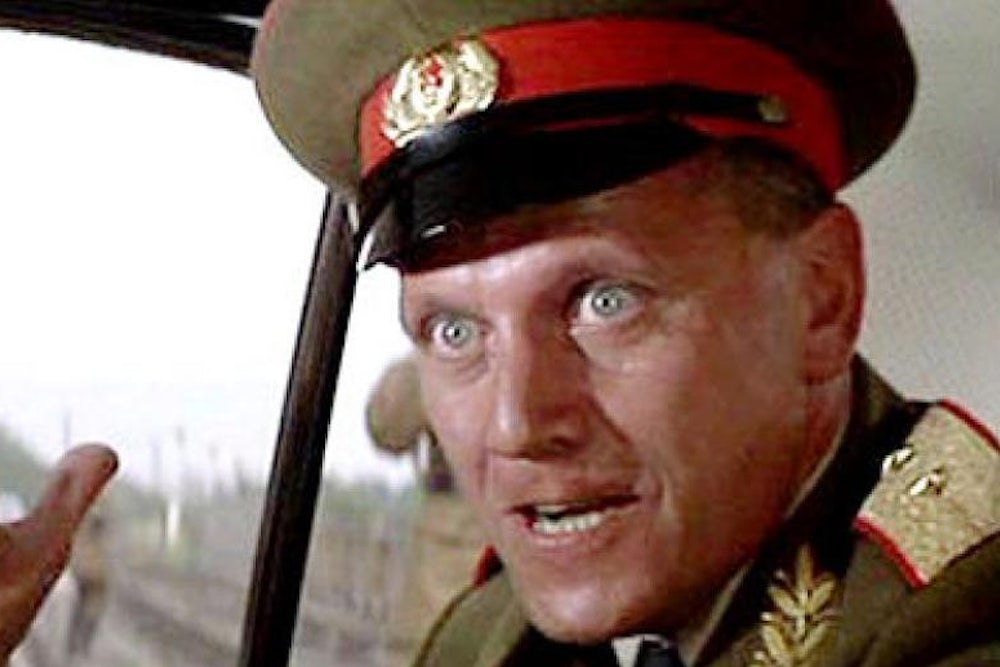Remember Anna Chapman? When it was revealed, in 2010, that a group of Russian citizens had been living in the United States under deep cover, Chapman became a weird kind of star. During the Cold War, a Soviet spy exposed in the West, or vice versa, was condemned to prison or death, or at least to a life of exile and notoriety. Chapman, on the other hand, leveraged her looks to become a tabloid celebrity and a cover girl in Russian Maxim; Vice President Biden cracked jokes about her on “The Tonight Show.”
This was the return of the Cold War, as Marx would have said, no longer as history but as farce. The idea of Russian spies in the U.S. was just not scary anymore; the days when we feared Moscow were dead and buried. And the return of the obsolete, in American culture, can only register as corniness or nostalgia. Thus the most lasting legacy of the program that placed Chapman and company in the U.S. is "The Americans": a TV show that turns espionage into entertainment, taking the undercover premise and relocates it to the waning days of the Cold War. Like "Happy Days," looking back to the 50s from the vantage point of the 70s, or "That '70s Show," which gave us the ’70s as imagined by the ’90s, "The Americans" is an exercise in the recycling of the past—something that always, for Americans, involves a degree of mockery. (Look at Keri Russell's '80s jeans!)
Now the events in the Ukraine have confronted us with the possibility that Russia is no joke. With Putin marshalling troops and launching test missiles, the echoes of the Cold War are growing more and more insistent. But it is precisely those echoes that are making it hard for us to assess the real dimensions of the threat—to take Putin and what he represents entirely seriously. Putin was a colonel in the KGB, but if KGB is the name of a fashionable-ironic bar in downtown Manhattan, how can we know whether to fear that legacy or laugh at it? There remains an undercurrent, in American discussion of the crisis, of disbelieving mockery: Putin is seen as some kind of oaf because he is simply untimely. He doesn't realize that the kind of big-power rivalry he is trying to provoke is just not done anymore. Isn't this supposed to be the end of history?
What we are seeing is a weird kind of negative feedback loop: The more dangerous Russia is, the more untimely it seems, so the less dangerous it appears. The problem is that, while Putin's government and his ideology have little to do with the Soviet Union, the Soviet Union remains our reflexive frame of reference for anything having to do with Russian geopolitics; and the Soviet Union is no longer frightening to us. Partly this is a generational issue. No one under 30 today remembers the Cold War at all; no one under 60 played any major role in waging it. What remains is the defunct iconography of Cold War pop culture: Russian villains from the Bond movies to Rocky to Boris and Natasha, which could not seem less threatening today.
If we no longer know quite how to think and feel about Russia, it's partly a sign of how anomalous the Cold War really was in American history. America's relationships with some European countries—Britain, France—go back to the roots of our national DNA; with Latin American and Pacific countries, our geography entangles us. But Russia, with its traditional ambitions in Central Asia and Eastern Europe, never ought to have intersected with American geopolitical interests. It was ideology that made the Cold War global, turning the post-World War II settlement into a matter of superpower conflict. And Putinism is not quite an ideology, though it seems to want to be: a mishmash of nationalism and conservatism, presenting the deeply unlikely spectacle of a geopolitcal movement whose most salient belief appears to be homophobia.
The absence of such an ideological conflict, combined with a post-Iraq weariness and self-suspicion, has resulted in the strange spectacle of American liberals eagerly embracing the kind of sphere-of-influence argument once associated with the coldest Metternichian realism. Ukraine is Russia's backyard, we now hear from many on the left (and the old right); if we couldn't stop Khrushchev in Budapest, why pretend we can stop Putin in Kiev? There is a kind of reverse Monroe doctrine coming into being, rooted in an ancient American disdain for the Old World and its power politics: let Europe suffer from being Europe, while we do our best to enjoy not being Europe. After all, the Cold War is over.
It is true, the Cold War is over; but Russia does not have to be a totalitarian power to be a dangerous one. A longer view of history, one that goes past 1989 and even past 1945, might remind us that the technique Putin is now employing in the Ukraine—intervention and partition to protect co-ethnics—is exactly the one that led Europe to war in 1939, when Hitler used it in Czechoslovakia and Poland, and in 1914, when the Tsars used it in Serbia. Whatever happens in Ukraine today or tomorrow, this kind of challenge to the international order is not likely to go away soon. We need to stop chuckling at the Russians we remember from the Cold War and start worrying about the ones we are actually facing today.
Stay informed with The New Republic's Ukraine Newsletter. Sign-up here.
